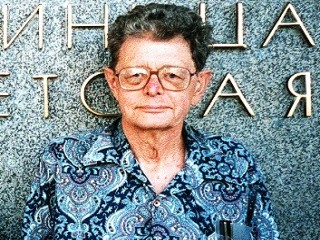
Poul Anderson biography
Date of birth : 1926-11-25
Date of death : 2001-07-31
Birthplace : Bristol, Pennsylvania, U.S.
Nationality : American
Category : Famous Figures
Last modified : 2011-05-14
Credited as : Author, Tau Zero, three Nebula Awards
0 votes so far
Poul Anderson is remembered as one of the most imaginative and hugely prolific authors of science fiction’s Golden Age, yet his solid body of work spans several decades beyond. The winner or nominee of at least 30 major science fiction awards, he produced some 70 novels, many which (Tau Zero, Brain Wave, The High Crusade and Three Hearts and Three Lions), continue to be popular today, despite the glut of more recent authors. The published author of over 100 short stories (plus novellas and novelettes and even a handful of chapbooks), Anderson's work has appeared in scores of anthologies. In the early days of science fiction many of them made their first appearance in such pulp fiction magazines as Amazing, Analog, Fantastic Stories, and Astounding.
Born November 25, 1926, in Bristol, Pennsylvania, Anderson grew up in Minnesota and Texas. It was in 1947, while still as student at the University of Minnesota that he published his first story. In 1948 he graduated with a B.S. in physics and in 1953 he married fellow science fiction writer Karen Kruse. The couple later settled in the San Francisco area.
As a writer, Anderson defied pigeonholing, save to say that he was a good writer who occasionally great. Arthur C. Clarke has remarked that he had "handled every conceivable theme in the genre" of science fiction, and Anderson’s tales had the knack for pairing up unusual characters and premises to generate unique and often highly amusing adventures. In The High Crusade, for example, aliens land in (later to be) Britain bent on conquest, only to find themselves commandeered by the local lord and knights --who try to hijack the vessel for use in retaking the Holy Land.
Meanwhile Brain Wave (1954) continues to impress readers, postulating that space is not uniform but contains various force fields through which star systems, and therefore planets, pass in their (very real) cosmic orbit – and more importantly, what if these force fields interact with sentience, causing humans and other creatures to be falsely limited in their intellectual potential. Anderson paints a future in which Earth’s sentient creatures emerge from the effects of such an inhibiting field, to find themselves quickly evolving, and rendering obsolete the customs and assumptions of countless millennia.
On July 31, 2001 Poul Anderson passed away at his home in Orinda, California after a battle with cancer. He is survived by his wife Karen Anderson, his children and grandchildren, and a slew of memorable characters. Poul Anderson was a former President of the Science Fiction and Fantasy Writers of America (1972), Guest of Honor at the World Science Fiction Convention, and the winner of three Nebula Awards and seven Hugo Awards. In 1997 he was awarded S.F.W.A.'s Grandmaster Award and in 2000 he was inducted into the Science Fiction and Fantasy Hall of Fame. He was also awarded the John W. Campbell Memorial Award for Genesis in 2000. His work has also been published under the pseudonyms A.A. Craig, Michael Karageorge, and Winston P. Sanders.
Author of books:
Vault of the Ages (1952)
The War of Two Worlds (1953)
Brain Wave (1954)
The Broken Sword (1954)
No World of Their Own (1955)
Planet of No Return (1956)
The Enemy Stars (1959)
Perish by the Sword (1959)
The Golden Slave (1960)
The High Crusade (1960)
Murder in Black Letter (1960)
Rogue Sword (1960)
Orbit Unlimited (1961)
Twilight World: A Science Fiction Novel of Tomorrow's Children (1961)
After Doomsday (1962)
The Makeshift Rocket (1962)
Murder Bound (1962)
Shield (1963)
Three Worlds to Conquer (1964)
The Corridors of Time (1965)
The Star Fox (1965)
The Fox, the Dog, and the Griffin (1966)
World without Stars (1966)
The Horn of Time (1968)
Beyond the Beyond (1969)
Infinite Voyage (1969)
Seven Conquests (1969)
Tau Zero (1970)
The Byworlder (1971)
The Dancer from Atlantis (1971)
Operation Chaos (1971)
There Will Be Time (1972)
Hrolf Kraki's Saga (1973)
The People of the Wind (1973)
Fire Time (1974)
Inheritors of the Earth (1974, with Gordon Eklund)
The Worlds of Poul Anderson (1974)
Homeward and Beyond (1975)
Homebrew (1976)
The Winter of the World (1976)
A World Named Cleopatra (1977)
The Avatar (1978)
Two Worlds (1978)
The Demon of Scattery (1979)
The Merman's Children (1979)
The Devil's Game (1980)
Method of Holding the Three Ones (1980)
Conquests (1981)
The Dark Between the Stars (1981)
Explorations (1981)
Fantasy (1981)
Winners (1981)
The Gods Laughed (1982)
Maurai and Kith (1982)
New America (1982)
Conflict (1983)
Orion Shall Rise (1983)
Cold Victory: Grassy Knoll (1985)
New America: Grassy Knoll (1985)
No Truce with Kings (1986)
The Boat of a Million Years (1989)
Inconstant Star (1990)
Alight in the Void (1991)
Kinship with the Stars (1991)
Starfarers (1998)
Operation Luna (1999)
Genesis (2000)
Hokas Pokas (2000, with Gordon R Dickson)
Mother of Kings (2001)
For Love and Glory (2003)
Awards:
Hugo 1961 Best Short Fiction, for 'The Longest Voyage'
Hugo 1964 Best Short Fiction, for 'No Truce with Kings'
Hugo 1969 Best Novelette, for 'The Sharing of Flesh'
Hugo 1973 Best Novelette, for 'Goat Song'
Hugo 1979 Best Novelette, for 'Hunter's Moon'
Hugo 1982 Best Novela, for 'The Saturn Game'
Nebula 1972 Best Novella, for 'The Queen of Air and Darkness'
Nebula 1973 Best Novella, for 'Goat Song'
Nebula 1982 Best Novella, for 'The Saturn Game'
















